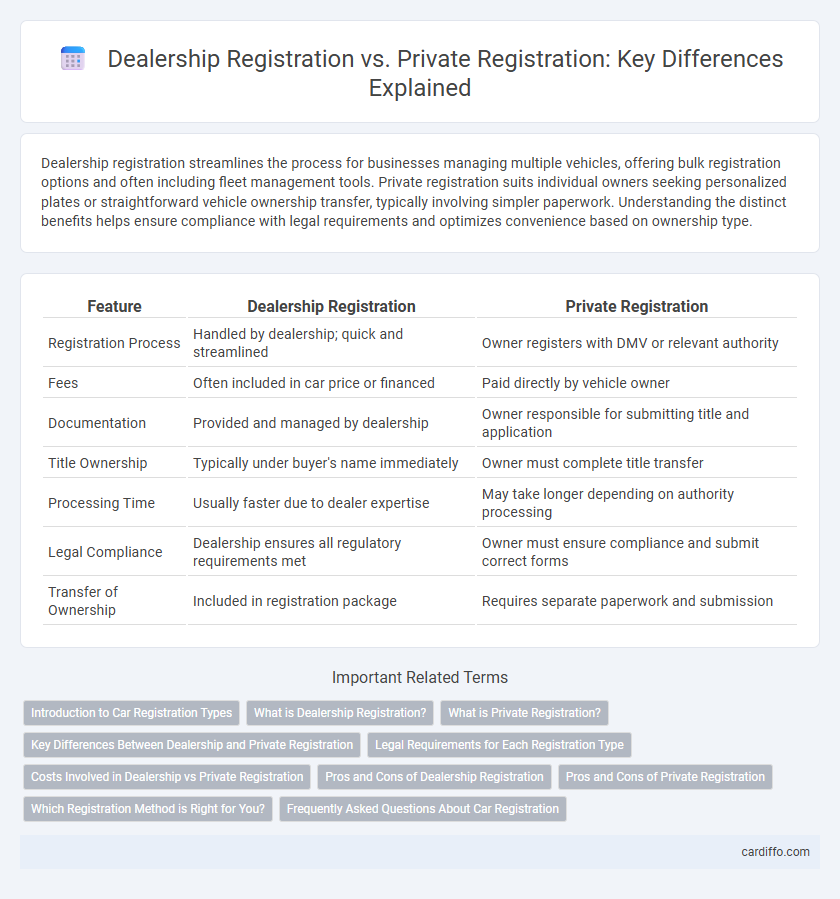Dealership registration streamlines the process for businesses managing multiple vehicles, offering bulk registration options and often including fleet management tools. Private registration suits individual owners seeking personalized plates or straightforward vehicle ownership transfer, typically involving simpler paperwork. Understanding the distinct benefits helps ensure compliance with legal requirements and optimizes convenience based on ownership type.
Table of Comparison
| Feature | Dealership Registration | Private Registration |
|---|---|---|
| Registration Process | Handled by dealership; quick and streamlined | Owner registers with DMV or relevant authority |
| Fees | Often included in car price or financed | Paid directly by vehicle owner |
| Documentation | Provided and managed by dealership | Owner responsible for submitting title and application |
| Title Ownership | Typically under buyer's name immediately | Owner must complete title transfer |
| Processing Time | Usually faster due to dealer expertise | May take longer depending on authority processing |
| Legal Compliance | Dealership ensures all regulatory requirements met | Owner must ensure compliance and submit correct forms |
| Transfer of Ownership | Included in registration package | Requires separate paperwork and submission |
Introduction to Car Registration Types
Car registration types primarily include dealership registration and private registration, each serving distinct purposes. Dealership registration typically involves vehicles sold by authorized dealers, offering streamlined paperwork and temporary plates for easy transfer of ownership. Private registration, handled personally by individual buyers or sellers, requires direct submission of documents to the motor vehicle department and often involves more manual steps and verification.
What is Dealership Registration?
Dealership registration is a specific vehicle registration process where a dealership registers vehicles in bulk under its name for sale or lease purposes. This type of registration allows dealerships to manage inventory and track vehicle status before transferring ownership to buyers. It differs from private registration, which is the process individuals use to register vehicles for personal use.
What is Private Registration?
Private registration refers to the assignment of personalized or customized license plates to a vehicle, allowing owners to select unique letter and number combinations rather than standard government-issued sequences. These registrations are often used to enhance the identity or branding of the vehicle, and they can be transferred between vehicles or sold separately from the vehicle itself. Private registrations differ from dealership registration, which typically involves temporary plates issued to dealerships for vehicles they have in stock or are testing.
Key Differences Between Dealership and Private Registration
Dealership registration involves the vehicle being registered under the dealership's name or business entity, often allowing temporary plates and streamlined paperwork for resale purposes. Private registration means the vehicle is registered directly to an individual, granting full ownership and personal responsibility for taxes, insurance, and legal compliance. Key differences include transfer processes, fee structures, and liability, with dealership registration typically facilitating quicker vehicle turnover and private registration ensuring personal ownership rights.
Legal Requirements for Each Registration Type
Dealership registration requires compliance with state-specific licensing laws, including obtaining a dealer's license, maintaining a physical business location, and adhering to regulations for vehicle sales and documentation. Private registration mandates individual ownership proof, valid identification, and submission of title and registration forms directly to the motor vehicle department, with fewer ongoing regulatory obligations. Legal requirements for dealership registration often involve stricter scrutiny, including bonding and regular audits, while private registration focuses primarily on personal ownership validation.
Costs Involved in Dealership vs Private Registration
Dealership registration often involves higher upfront costs due to dealer fees, administrative charges, and added services like warranty packages, whereas private registration typically incurs lower fees primarily limited to government taxes and standard registration expenses. Private registration costs can be more predictable and affordable for individual buyers, while dealerships may include additional costs that reflect convenience and marketing overhead. Understanding these cost differences helps buyers make informed decisions based on budget and service expectations.
Pros and Cons of Dealership Registration
Dealership registration offers advantages such as streamlined paperwork, access to exclusive vehicle inventory, and potential financing options, making it a convenient choice for buyers seeking reliability and support. However, it often comes with higher costs, including dealer fees and markups, compared to private registration, which might offer better negotiation flexibility and lower prices but lacks the dealer's warranty and buyer protection. Choosing dealership registration ensures professional assistance and legal compliance but requires careful consideration of the overall expense and added services.
Pros and Cons of Private Registration
Private registration offers personalized and memorable vehicle identification, enhancing brand visibility and allowing for easy recall compared to standard dealership plates. However, private registration often incurs higher costs, including premium fees and potential administrative complexity when transferring ownership. Despite these expenses, private plates can increase vehicle value and provide a unique personal or business identity on the road.
Which Registration Method is Right for You?
Choosing between dealership registration and private registration depends on factors like convenience, cost, and control over the process. Dealership registration offers a streamlined, hassle-free experience often bundled with vehicle purchase, while private registration allows for potentially lower fees and personalized documentation management. Evaluate your priorities regarding ease, expenses, and timing to determine the registration method that best suits your needs.
Frequently Asked Questions About Car Registration
Dealership registration often streamlines the vehicle registration process by handling paperwork and fees directly with the DMV, while private registration requires the individual owner to complete these steps personally. Frequently asked questions about car registration often address differences in cost, required documentation, and processing times between dealership and private registrations. Understanding these distinctions helps vehicle buyers prepare necessary identification, proof of insurance, and payment methods for a smoother registration experience.
Dealership Registration vs Private Registration Infographic

 cardiffo.com
cardiffo.com